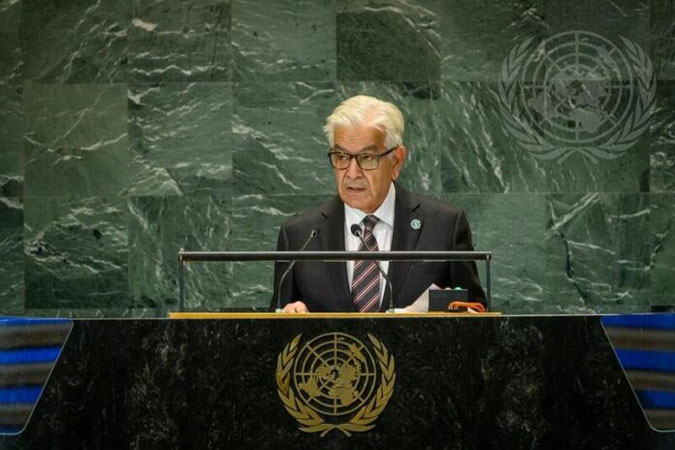Our Terms & Conditions | Our Privacy Policy
UN’s Pact for Future must implement commitments to developing countries: Khawaja Asif
 Pakistan has called the UN’s Pact for the Future, which is aimed at transforming the multilateral system, an expression of the international community’s collective determination to respond to global challenges, and called for upholding the commitments made in the game-changing document.
Pakistan has called the UN’s Pact for the Future, which is aimed at transforming the multilateral system, an expression of the international community’s collective determination to respond to global challenges, and called for upholding the commitments made in the game-changing document.
“The Pact will be transformative only if we translate the commitments undertaken into concrete action,” Defence Minister Khawaja Muhammad Asif told the Summit of the Future on its second and concluding day.
At the outset of his remarks, he emphatically warned that “no sustainable development can take place till tragedies like Gaza are perpetuated by the developed world.”
Sunday’s comprehensive pact, which world leaders approved by consensus, aims to strengthen global governance and tackle key challenges facing humanity, including sustainable development, international peace, and technological innovation, youth and future generations and transforming global governance. It also proposes detailed action plans to address these challenges.
“For the over 100 developing countries, the Pact offers an opportunity to revitalize development and to reform the unequal international financial and economic system.,” he said in the iconic hall of the UN General Assembly with heads of state/government and others in this high-level delegate arrayed in front of him.
In this regard, Khawaja Muhammad Asif underscored the need for bridging the $4 trillion SDG (Sustainable Development Goals) financing gap by fulfilling the ODA (Official Development Assistance) commitments; implementing the UN Secretary-General’s SDG Stimulus proposal; re-channeling 50% of the unused 2021 allocation of SDRs (Special Drawing Rights); delivering a more ambitious IDA (International Development Association) by ensuring a robust $100 billion replenishment; enlarging lending by the multilateral development banks; and lowering borrowing costs for developing countries.
The Defence Minister also called for ensuring global economic equity by improving the representation of developing countries in international financial institutions; reviewing the sovereign debt architecture to make it more equitable; adopting an equitable international tax regime; and reforming the WTO (World Trade Organization) to serve as a vehicle for export expansion and development, through preferential treatment for developing countries and avoidance of new environmental protectionism.
Images are for reference only.Images and contents gathered automatic from google or 3rd party sources.All rights on the images and contents are with their legal original owners.



Comments are closed.